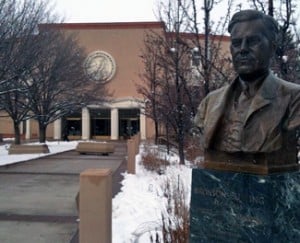
The Roundhouse in Santa Fe (Photo by Peter St. Cyr)
As NMPolitics.net reported last week, Gov. Susana Martinez has signaled that she will allow broad consideration of campaign finance reform issues. Since then she’s given her support to several government accountability proposals, but not to others.
Closing the revolving door
Martinez used her state of the state address to announce her support for a two-year cooling-off period that would prevent state lawmakers from lobbying their former colleagues for two years after leaving the Legislature.
Rep. Nate Gentry, R-Albuquerque, is expected to introduce that bill shortly.
Meanwhile, Sen. Dede Feldman, D-Albuquerque, has re-filed a bill (not yet online) that would institute a one-year cooling-off period. It’s essentially the same bill she introduced last year, but would also prohibit former lawmakers from lobbying the executive branch.
Sen. Dede Feldman
“I think one should not be able to use the relationships that one has made while a legislator to further the interests of a private business or other institution,”Feldman said in an interview yesterday. Watch the video to the right for the full interview.
In 2011, Feldman’s proposal failed to get out of the Senate Rules Committee. A bit of trivia: One of the members of the Rules Committee then was Sen. Kent Cravens R-Albuquerque, who recently left the Legislature to become a lobbyist for the New Mexico Oil and Gas Association.
Cracking down on corruption
Gentry and Sen. George Muñoz, D-Gallup, have introduced mirror bills that would increase prison time for elected officials convicted of corruption, ban them from lobbying or contracting with the state, and eliminate their pensions.
Martinez has endorsed the bill, which last year was unanimously passed by the House but died in the Senate.
Reps. Zach Cook, R-Ruidoso, and and Joseph Cervantes, D-Las Cruces, will cosponsor a bill, also endorsed by the governor, that would require a public official who pleads guilty to or is convicted of corruption to be removed from office immediately, according to Martinez’s spokesman Scott Darnell. That bill is not yet online.
Another proposal would have taxpayers not pay for the legal defense of a public official being sued by the state for corruption. Sen. John Ryan, R-Albuquerque, will carry that bill, Darnell said in an e-mail Thursday.
Dealing with U.S. Supreme Court decisions
Sen. Peter Wirth
The governor has been mum, however, on a proposal (SB 11) from Sen. Peter Wirth, D-Santa Fe, that he said Thursday will “do the one thing that Citizens United said we could still do, which is… require to disclose the donors so that voters going to the polls… can know where they money’s coming from.” (Video at left.)
The bill would require organizations making independent expenditures to disclose the name of the person who made the expenditure, the names of the people who received the expenditure, and perhaps most notably, the names of every person who donated more than $100 for the expenditure.
Sen. Eric Griego
Wirth said he has high hopes for passage because a similar bill passed the Senate last year but ran out of time on the House side; this year his bill passed unanimously out of the Interim Courts Corrections and Justice Committee, he said Thursday.
Wirth’s Democratic colleagues, Sens. Steve Fischmann of Las Cruces and Eric Griego of Albuquerque, have sponsored memorials (Fischmann’s is here) in opposition to the Citizens United decision and in support of changes to the campaign finance at the federal level.
Memorials don’t have the force of law, but Griego said (video at right) that passing his memorial will show the federal government that states are ready to pass a constitutional amendment overturning Citizens United.
Fischmann said Thursday that he will not accept any corporate money and denounced such donations as a usurpation of shareholders’ rights (video below).
Sen. Steve Fischmann
Wirth is also sponsoring a bill (SB 12) that would make changes to the state’s public financing system in the wake of a decision earlier this year by the U.S. Supreme Court that invalidated parts of our system — specifically the way the state distributed matching funds to candidates whose opponents raised more private donations.
Wirth is proposing that instead of getting more matching funds, publicly-financed candidates be allowed to raise more money to compete with better-financed opponents.